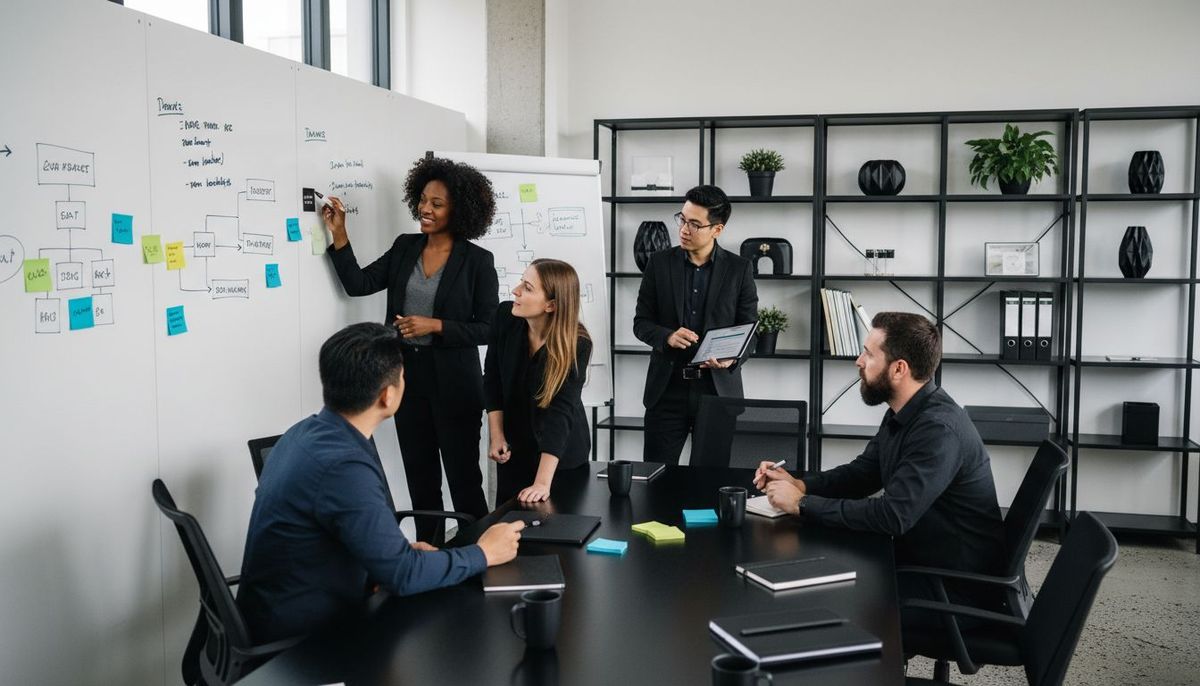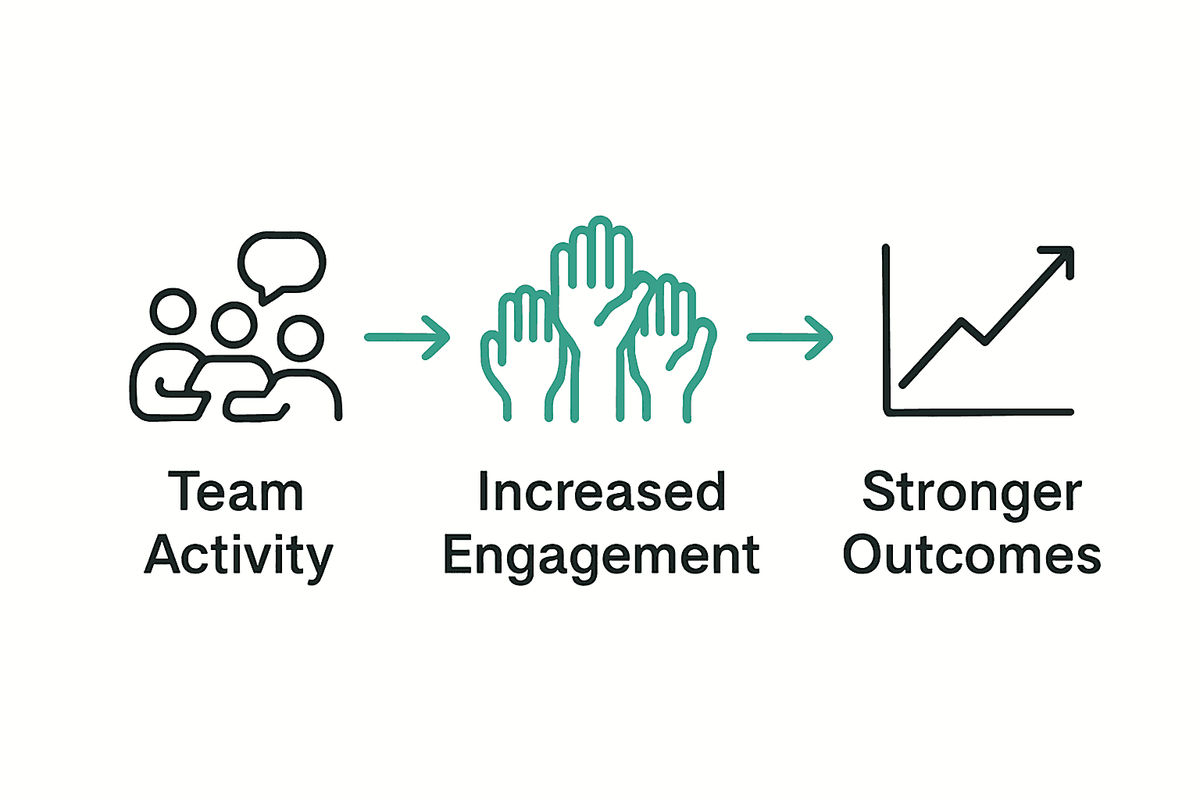Professional Bar Trivia SoftwareFor Venues & Events
- Players join via QR code — no app download
- 6 round types: Buzzer Race, Everyone Answers & more
- Rich media questions with images, video & audio
- Real-time scoring & leaderboards on the big screen
Team Activities Explained: Building Stronger Workplaces
November 24, 2025

Nearly 90 percent of american companies report that effective team activities lead to stronger collaboration and higher workplace satisfaction. With so many tasks pulling teams in different directions, the right experiences can turn a group of individuals into a connected, motivated unit. This guide breaks down what truly makes team activities valuable for the american workplace, highlighting strategies that foster trust, creativity, and real results.
Table of Contents
- Defining Team Activities And Core Concepts
- Types Of Team Activities For Workplaces
- How Team Activities Foster Engagement
- Benefits For Corporate Teams And Organizations
- Common Pitfalls And How To Avoid Them
- Alternatives To Traditional Team Activities
Key Takeaways
| Point | Details |
|---|---|
| Importance of Team Activities | Team activities enhance collaboration, communication, and overall effectiveness in the workplace. They create opportunities for meaningful interactions that build trust and improve group dynamics. |
| Diverse Activity Types | Various types of team activities, such as problem-solving challenges and creative workshops, support different organizational needs and employee engagement. They foster innovation and enhance team spirit. |
| Engagement Strategies | Successful team activities should encourage open communication, mutual trust, and shared experiences to drive employee engagement and enhance team performance. |
| Avoiding Common Pitfalls | To ensure effective team building, it is crucial to avoid forced interactions and inadequate planning, and to focus on genuine engagement that respects individual preferences and encourages collaboration. |
Defining Team Activities and Core Concepts
Team activities represent strategic interventions designed to strengthen workplace collaboration, communication, and collective performance. According to the Wikipedia Input–Process–Output model, these activities fundamentally influence how teams function by affecting critical inputs, processes, and eventual outputs.
Team Building encompasses a wide range of structured experiences aimed at enhancing group dynamics and interpersonal relationships. Wikipedia's team building overview highlights these activities as crucial mechanisms for defining roles, improving social interactions, and driving collaborative performance. Effective team activities typically include:
- Problem-solving challenges
- Communication skill workshops
- Collaborative game experiences
- Shared goal-setting sessions
- Trust-building exercises
Successful team activities go beyond simple entertainment. They create intentional opportunities for team members to interact outside traditional work contexts, revealing individual strengths, communication styles, and potential collaboration strategies. By designing experiences that require mutual cooperation, organizations can unlock deeper understanding of team member capabilities and potential synergies.

Ultimately, team activities serve as powerful tools for transforming groups of individuals into cohesive, high-performing units. When carefully crafted and purposefully implemented, these experiences can dramatically improve workplace relationships, productivity, and overall team effectiveness.
Types of Team Activities for Workplaces
Workplace team activities represent strategic approaches to enhancing organizational dynamics and employee engagement. Web HR Blog outlines several critical categories of team activities that can transform workplace interactions and productivity.
Collaborative Activities serve multiple purposes in organizational settings. These typically include:
- Icebreaker Games: Quick activities designed to help team members connect and feel comfortable
- Problem-Solving Challenges: Structured exercises that test critical thinking and teamwork
- Physical Team Challenges: Activities like relay races that boost team spirit and physical energy
- Creative Workshops: Sessions encouraging innovation and out-of-box thinking
- Group Learning Experiences: Opportunities for collective skill development
According to Theseus Research, these team-building activities are essential for improving communication, introducing individuals to new collaborative environments, and developing critical interpersonal skills. The most effective activities go beyond simple entertainment, creating meaningful opportunities for genuine connection and mutual understanding.
Successful team activities are intentionally designed to address specific organizational needs. They can help break down communication barriers, reveal individual strengths, and create a more cohesive workplace culture. Whether through competitive games, collaborative challenges, or reflective group experiences, these activities provide powerful mechanisms for transforming workplace relationships and driving collective performance.
How Team Activities Foster Engagement
Team activities play a critical role in transforming workplace dynamics and driving employee engagement. NCBI Research highlights the importance of structured interventions like team debriefs, which convert recent experiences into meaningful learning opportunities that directly enhance team effectiveness and engagement.
Engagement Mechanisms in team activities typically involve several key strategies:
- Creating shared experiences
- Encouraging open communication
- Developing mutual trust
- Recognizing individual contributions
- Providing collaborative challenge opportunities
Interestingly, ArXiv Research suggests that teams with flat, egalitarian structures are more likely to sustain long-term engagement. These approaches distribute leadership responsibilities and create environments where every team member feels valued and empowered to contribute.
Ultimately, successful team engagement goes beyond superficial interactions. How to Encourage Team Participation requires intentional design that speaks to deeper human needs for connection, recognition, and meaningful collaboration. By creating spaces where individuals can authentically interact, share challenges, and collectively solve problems, organizations can transform traditional workplace relationships into dynamic, innovative team ecosystems.

Benefits for Corporate Teams and Organizations
Wikipedia's research highlights the transformative power of incorporating play into workplace environments, revealing that strategic team activities can dramatically enhance employee satisfaction, creativity, and overall team performance. By introducing playful interactions, organizations create spaces that reduce workplace stress and promote positive emotional experiences.
Organizational Benefits of team activities extend across multiple critical dimensions:
- Improved communication channels
- Enhanced problem-solving capabilities
- Increased employee motivation
- Reduced workplace tension
- Accelerated knowledge sharing
According to ArXiv Research, strategic team-building activities are particularly powerful in creating diverse team compositions that directly correlate with enhanced innovation and complex problem-solving capabilities. These interventions help break down departmental silos and encourage cross-functional collaboration.
Understanding Corporate Team Bonding suggests that the most effective team activities are those that feel organic and genuinely engaging. By designing experiences that balance professional development with authentic human connection, organizations can transform traditional workplace interactions into dynamic, collaborative ecosystems that drive collective performance and individual growth.
Common Pitfalls and How to Avoid Them
ArXiv Research reveals that dynamic team compositions can significantly disrupt task performance when proper coordination mechanisms are not established. Understanding and anticipating potential challenges is crucial for successful team activities and organizational interventions.
Critical Pitfalls in team-building experiences often include:
- Forced or inauthentic interactions
- Inadequate pre-activity planning
- Overlooking individual team member preferences
- Neglecting follow-up and reflection processes
- Creating competitive instead of collaborative environments
According to ArXiv Research, one of the most significant challenges is team formation, which can be effectively addressed by utilizing advanced approaches like artificial intelligence tools to create heterogeneous teams. These tools can strategically match team members based on complementary competencies and personality dynamics.
To mitigate these risks, Purpose of Team Events Guide recommends developing a structured yet flexible approach. This involves carefully designing activities that respect individual differences, encourage genuine engagement, and create meaningful opportunities for team members to connect authentically while achieving specific organizational objectives.
Alternatives to Traditional Team Activities
Wikipedia's research on serious play reveals innovative approaches that go beyond conventional team-building exercises. Methods like Lego Serious Play and improv theater offer dynamic alternatives that spark creativity and problem-solving in workplace contexts, transforming traditional interaction models.
Alternative Team Activity Strategies include:
- Improv theater workshops
- Lego Serious Play sessions
- Interactive simulation experiences
- Design thinking challenges
- Collaborative storytelling exercises
According to Wikipedia's team-based learning overview, structured collaborative learning provides another powerful alternative to traditional team activities. These approaches focus on creating meaningful engagement through carefully designed interactive experiences that promote genuine skill development and team cohesion.
Hybrid Team Building Activities suggests that modern organizations need flexible, adaptable approaches that can work across physical and virtual environments. By reimagining team interactions as dynamic, purposeful experiences, companies can create more meaningful connections that transcend traditional boundaries of workplace engagement.
Transform Your Team Dynamics with Engaging Activities
The article highlights the challenge many organizations face in creating meaningful and authentic team activities that foster genuine collaboration, trust, and engagement. It points out how traditional exercises can sometimes feel forced or ineffective, missing the mark on building lasting workplace bonds or enhancing communication. If you are aiming to overcome common pitfalls such as inauthentic interactions or disconnected team experiences, embracing interactive, customizable solutions is key. Concepts like creating shared experiences, encouraging open communication, and balancing fun with purpose align closely with successful strategies for stronger workplaces.
At quizado.com, we offer a flexible, entertaining platform designed to bring teams together through quiz-based games inspired by popular shows like Jeopardy and Family Feud. These activities address pain points like lack of genuine engagement and weak team cohesion by enabling teams to compete, collaborate, and learn in an exciting environment. Our software supports remote control via smartphones, custom branding, and tailored question banks, making it easy to create personalized experiences that resonate with your employees’ unique dynamics.

Ready to revitalize your team-building efforts with interactive, customized games that go beyond the usual icebreakers and trust falls? Discover how quizado.com can help you transform workplace relationships and boost morale today. Start your journey to stronger team connections now by exploring our platform and seeing how easy it is to host your next engaging team activity from anywhere.
Frequently Asked Questions
What are team activities and their purpose?
Team activities are strategic interventions aimed at strengthening collaboration, communication, and performance within a workplace. They help define roles, improve interpersonal relationships, and enhance group dynamics to create cohesive, high-performing teams.
What types of team activities can improve workplace engagement?
Types of effective team activities include icebreaker games, problem-solving challenges, physical team challenges, creative workshops, and group learning experiences. These activities foster collaboration and boost employee morale.
How do team activities enhance communication among team members?
Team activities promote open communication by encouraging team members to interact in informal settings. They help break down barriers and facilitate understanding of individual strengths and collaboration styles, leading to improved workplace relationships.
What are common pitfalls to avoid when planning team activities?
Common pitfalls include forced interactions, inadequate planning, overlooking individual preferences, neglecting follow-up, and creating overly competitive environments. To avoid these issues, ensure activities are well-structured and respect team members' differences.
Recommended
Start Hosting Bar Trivia Tonight
Try Quizado free — no download needed. Host your first trivia night tonight!

